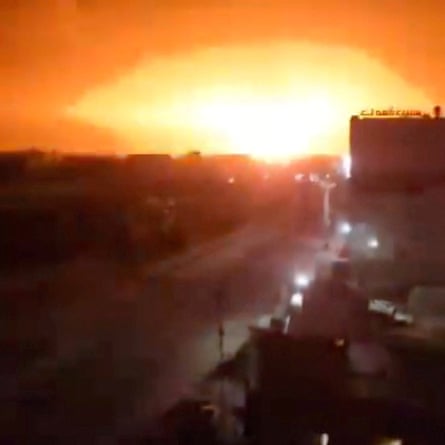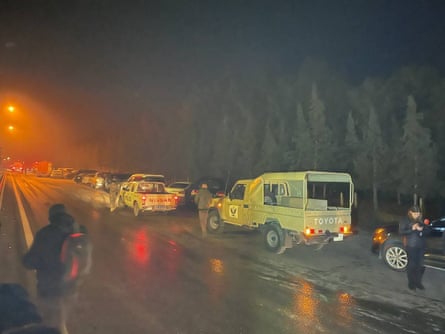On Thursday morning the Iranian news website Entekhab ran, without irony, the headline: “Taliban call on Pakistan and Iran to show restraint and urge both sides to settle differences through diplomatic means”.
If proof were needed that a new, more dangerous world order may be upon us, the Taliban cast in the role of advocates for restraint seems conclusive.
Each day this week evidence mounted that the long-feared moment of escalation born out of the destabilising war in Gaza had arrived. The scenes in Gaza were too raw, and the geopolitical consequences for the conflict too vast, to remain confined within its borders.
Last weekend, four waves of US missile strikes, some involving the UK, hit the ports and inland strongholds of the Houthis in Yemen. On Monday, Iran fired 24 missiles at an alleged Israeli spy centre in Erbil, in Kurdish northern Iraq, and at the same time struck Islamic State sites in Idlib, northern Syria. By Tuesday, Iran had broken new ground by striking Jaish al-Adl, a Sunni separatist group operating in Pakistan close to Iran’s border. The group was responsible not for the suicide bombing in Kerman on 3 January that killed more than 80 people at a ceremony marking the assassination of the Revolutionary Guards leader Qassem Suleimani, but instead for the killing in December of 11 police officers in the Iranian city of Rask, in the south-eastern province of Sistan-Balochistan.
Unlike Iraq, Pakistan was prepared to respond. Within 48 hours its forces said it “successfully struck hideouts used by terrorist organisations, namely Balochistan Liberation Army and Balochistan Liberation Front in Iran itself”. It pointed out it had warned Iran for years about its ungoverned spaces threatening Pakistan.
All the while, Hezbollah and Israel exchanged now familiar rocket fire on the southern Lebanese border, so much so that the Israeli chief of staff, Lt Gen Herzi Halevi, admitted the possibility of all-out war was increasing.
Gaza’s looming famine and the spread of hepatitis A were temporarily turned into a sideshow.
Not every dot in the Middle East can be joined. Not all these conflicts are connected, or have their precise roots in Hamas’s 7 October attack on Israel, and some will be doused. But they at least blend, in part because they reveal a collective erosion of self-restraint and the rule of law. Iran and Pakistan, for instance, behaved – as has the US – as if they had a unilateral right to pursue counter-terrorism operations across national borders.

Iran may also have been sending a reminder to the US and Israel that it has the capability and political will not just to support its numerous allies, but to strike anywhere if it feels its national integrity is under threat, whether from Kurds, Sunnis or Balochs. Facing spring elections in which the turnout will matter more than the result, the regime displayed its determination to defeat threats to national unity.
Vali Nasr, a professor of Middle East studies at Johns Hopkins University, told the World Economic Forum in Davos this week there might be a wider motive linking back to Gaza.
“Iran and Hezbollah do not want Israel and the US to dictate the pace of the Gaza war; for Israel to finish Gaza on its own schedule and then decide what they are going to do with Hezbollah, and then the Houthis, and to decide what is the end game,” he said. “Iran and Hezbollah want to deny Israel and the US a chance to dictate the new order that is going to emerge in the Middle East, and they are opening as many fronts at the same time to deny them that capability.”
In striking as it did, Tehran took risks, alienating its allies Iraq and Pakistan, and underlining the divisions in the forces opposed to US support for Israel.

For instance, Khalid al-Yaqobi, a security adviser to the Iraqi prime minister, insisted no Mossad spy headquarters existed in Erbil. The attack, he said was an attempt by Iranian intelligence to mislead the Iranian leadership, and cover up its failure to prevent the Kerman attack.
With Iraq’s parliament closer than ever to ordering the US to remove its remaining 2,500 troops and close its military bases in the country – Iran’s great goal in Iraq – the attack on Erbil, repeating a similar episode in 2022, will only make the Iraqi prime minister, Mohammed Shia al-Sudani, more nervous that a US departure will leave his country at the mercy of Tehran.
Similarly, the attack in Pakistan gave Islamabad the chance to highlight how it had repeatedly complained to Tehran about its ungoverned spaces. The very fact that its airstrike inside Iran killed nine Pakistanis proved Islamabad’s point.
Iran, in response, argues the scale of its strikes, choice of targets, and diplomatic fallout shows the attacks did not constitute an escalation against the US, Israel or even Pakistan. Nothing Iran did removed any of the security buffers designed to prevent a direct conflict with the US over Gaza, it said.
However, the former head of the Iranian parliament’s national security and foreign relations committee, Heshmatollah Falahatpisheh, told Iran Watch that the attacks were shocking and badly timed. Iran was one of the most aggressive countries in the world and this was because diplomats were marginalised in government.

He said the true slope down to war remained in the Middle East, not on the Pakistan-Iran border. Moreover, the longer these pockets of war multiply in Gaza, Yemen and Lebanon, the greater the likelihood that each conflict becomes more intractable, deadly and contagious.
In Davos, with the world seemingly falling apart around them, Antony Blinken and Jake Sullivan, the US secretary of state and national security adviser respectively, sounded short of new solutions, returning yet again to their pet theme of normalisation between Saudi Arabia and Israel. This despite the Saudis, including their London ambassador, Prince Khalid bin Bandar, having said repeatedly since 7 October that it cannot happen without a pathway to a two-state solution.
In a further rebuff to Blinken’s diplomacy, Benjamin Netanyahu rejected the idea on Thursday, telling a press conference: “In any arrangement in the foreseeable future – with an arrangement or without one – Israel must have security control over all the territory west of the Jordan,” referring to the occupied territories that Palestinians intend to become an independent state.
Leaks concerning Washington’s frustration with the Israeli prime minister proliferate, but Netanyahu is impervious.
In London, at an event marking three months since the war began, the Palestinian ambassador Husam Zomlot, argued that Netanyahu, in a battle for political survival, was looking for chances to spread the conflict. Against such an explosive backdrop, he said, it was a dangerous failure of leadership for the US and the UK to defend the siege of Gaza, even though they did not share the objectives of the leader imposing that siege.
“The fact is that the US is the biggest political, legal, material, military backer of Israel,” Zomlot said. “Almost all of Israel’s weapons, including all these 2,000lb bombs that are falling on the heads of our families, are American. So either America doesn’t use its leverage, or doesn’t know how to use its leverage.”
Even after this tumultuous week, few signs have emerged that Biden has any intention of changing course.
"conflict" - Google News
January 20, 2024 at 01:00PM
https://ift.tt/4zR713W
Seemingly disparate Middle East conflicts show collective erosion of self-restraint - The Guardian
"conflict" - Google News
https://ift.tt/xWl6pJf
https://ift.tt/7Wxq20s
Bagikan Berita Ini














0 Response to "Seemingly disparate Middle East conflicts show collective erosion of self-restraint - The Guardian"
Post a Comment